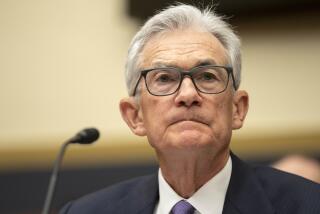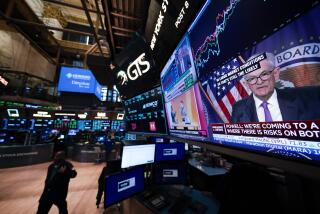Fed not ready to curb stimulus measures, Bernanke says
Federal Reserve Chairman Ben S. Bernanke won’t pull back the central bank’s easy money policies any time soon, even as the government is expected to report positive job growth Friday.
“Until we see a sustained period of stronger job creation, we cannot consider the recovery to be truly established,” Bernanke said Thursday.
And though the economic recovery “appears to have strengthened in recent months,” that growth isn’t happening fast enough, he said.
That should be clear Friday, when the government is expected to announce that the economy created about 140,000 jobs in January. The figure is unlikely to make a dent in the nation’s 9.4% unemployment rate.
As a result, Bernanke gave no indication the Fed would back off from the controversial stimulus plan that is pumping $600 billion from government bond purchases into the economy.
Indeed, he strongly defended the effort in the face of sharp criticism from top Republicans, strong objections from China, Germany and other global competitors and even questions about whether the central bank’s actions helped fuel the crisis in Egypt by driving up food prices.
“I think it’s entirely unfair to attribute excess demand pressures in emerging markets to U.S. monetary policy,” Bernanke said in a speech and wide-ranging question-and-answer session with journalists at the National Press Club.
Nigel Gault, chief U.S. economist for IHS Global Insight, said that despite some improved economic indicators, Bernanke knows the recovery is going to be gradual. And that makes a change in the Fed’s strategy unlikely.
“Once they embark on a program like that … it would take a lot to make them change,” Gault said. “You’d need to see much better evidence, better than we’ve seen, to make them stop.”
Bernanke sounded a slightly more upbeat note about the economy than Federal Reserve policymakers did after their meeting last week, Gault said. And with good reason. There have been more positive economic reports in recent days, including several on Thursday alone.
The Labor Department said first-time claims for unemployment benefits dropped to 415,000 last week, a decrease of 42,000 from the week before and well below the 425,000 that experts had estimated, on average. California was a major reason, accounting for about a third of the decrease.
Sales at chain stores increased last month as well — up a surprising 4.8% compared with last year — despite the bad weather in much of the nation, according to the International Council of Shopping Centers, a trade group.
The Institute for Supply Management said Thursday that its service sector index grew last month at the fastest pace in five years. And orders to U.S. factories were up 0.2% in December, the Commerce Department reported.
“Looking at the whole range of statistics on the labor market, the sense is that employers are becoming more willing to hire,” Bernanke said. “And I think we’ll start seeing some stronger payroll reports and some lower unemployment rates pretty soon.”
Even though more evidence indicates that “a self-sustaining recovery in consumer and business spending may be taking hold,” Bernanke said, he warned that the economy still was far from where it should be.
The continued slow recovery from the Great Recession prompted the Fed in November to further stimulate the economy by starting to purchase up to $600 billion in Treasury bonds. That sparked concerns that the additional money in circulation would boost inflation.
Bernanke acknowledge some “highly visible” price increases, such as for gasoline and other commodities, but said “overall inflation remains quite low.”
He argued the additional stimulus has improved economic growth, which has helped fuel higher stock prices as well. The Dow Jones industrial average rose for the fourth straight session Thursday, up 20.29 points to close at 12,062.26, its highest level since June 2008.
And Bernanke dismissed the notion that the Fed’s large-scale asset purchases caused inflation overseas, including higher food prices that were a factor in the unrest in Egypt and Tunisia. Bernanke said fast growth in emerging markets was causing food and commodity prices to rise there.
Those countries, he said, can adjust their own monetary policies to deal with inflation, including adjusting their exchange rates, “which in some cases they have been reluctant to do” — a reference to China.
As for Egypt, Bernanke said, “If the dollar is weaker, the Egyptian pound is stronger. Clearly what is happening is not a dollar effect.”
Bernanke also warned of the consequences of the soaring federal budget deficit, saying Congress and the White House needed to make tough decisions to reduce the “sustained high rates of government borrowing.”
“Our nation cannot reasonably expect to grow its way out of our fiscal imbalances, but a more productive economy will ease the trade-offs that we face,” he said.
A Fed committee is reviewing whether Bernanke should hold regular news conferences as a way of demystifying the central bank’s work. Thursday’s event was part of that outreach.
The session was not a typical news conference. As is its policy, the National Press Club asked for questions in writing from the audience. The host, club President Mark Hamrick, then asked Bernanke certain ones.
“On the one hand, real-time transparency is very important and valuable,” Bernanke said of the possibility of conducting regular news conferences.
“On the other hand, we don’t want to create unnecessary uncertainty, unnecessary volatility in financial markets by saying things that may be misinterpreted if they’re too ad hoc.”
More to Read
Get the L.A. Times Politics newsletter
Deeply reported insights into legislation, politics and policy from Sacramento, Washington and beyond. In your inbox three times per week.
You may occasionally receive promotional content from the Los Angeles Times.







